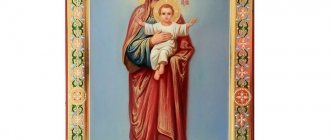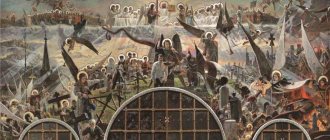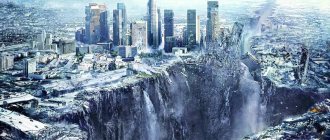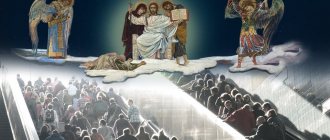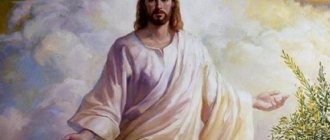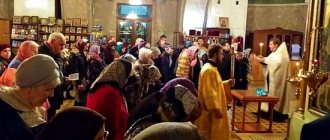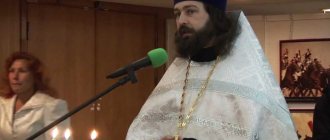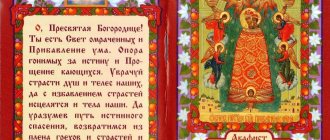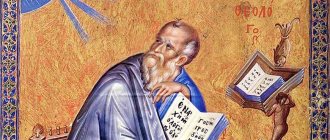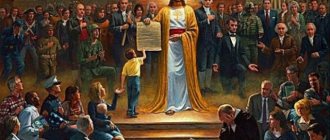The prophets Enoch and Elijah, two witnesses to the apocalypse, are said to have been taken alive to heaven. Who are they and when will they arrive? Or maybe they have already arrived, but they are not noticed? Why will they be sent to prophesy before the Second Coming and about what? If the preaching of the Eternal Gospel is already going on in all churches? If the Gospel is translated into all languages of the world. And are there other languages that it has not yet been translated into? And yet the prophets Enoch and Elijah, they say, will come at the end of time to prophesy and testify about Christ. Then, when there will be nothing left until the Coming of Jesus Christ. Two periods of 3.5 years, the Bible says. They will come in the first period of 1260 days. Where will they come and to whom will they prophesy or witness?
Who are Enoch and Elijah Apocalypse
- And I will give to My two witnesses, and they shall prophesy a thousand two hundred and sixty days, clothed in sackcloth.
- These are the two olive trees and the two lampstands standing before the God of the earth.
- And if anyone wants to offend them, fire will come out of their mouth and devour their enemies; if anyone wants to offend them, he must be killed.
- They have power to shut the heavens so that no rain falls on the earth in the days of their prophecy, and they have power over the waters to turn them into blood, and to smite the earth with every plague whenever they want.
- And when they have finished their testimony, the beast that comes out of the abyss will fight with them and defeat them and kill them,
- and their corpses will be left on the streets of the great city, which is spiritually called Sodom and Egypt, where our Lord was crucified.
- And many of the peoples and tribes and tongues and nations will look at their corpses for three and a half days, and will not allow their corpses to be put in graves.
- And those who live on the earth will rejoice and be glad, and will send gifts to each other, because these two prophets tormented those who live on the earth.
- But after three and a half days the spirit of life from God entered into them, and they both stood on their feet; and great fear fell upon those who looked at them.
- And they heard a loud voice from heaven saying to them, “Come up here.” And they ascended to heaven on a cloud; and their enemies looked at them.
Enoch and Elijah are taken alive to heaven
Everyone has probably already heard the interpretation that at the end of time the prophets Enoch and Elijah will come. This opinion is due to the fact that there is no information that the prophet Enoch died. The Prophet Elijah, as stated in the Old Testament, was taken to heaven on a chariot of fire.
In addition, there is a prophecy from Malachi that the prophet Elijah will yet come:
Behold, I will send Elijah the prophet to you before the coming of the great and terrible day of the Lord. And he will turn the hearts of the fathers to the children and the hearts of the children to their fathers, so that when I come I will not smite the earth with a curse. Small 4:5
If Elijah didn't die, where is he now?
Elijah and the chariot of fire (fragment).
Giuseppe Angeli, 1740-55. National Gallery of Art, Washington, USA By the time of the reign of Joram (son of Ahab), Elijah had acquired enormous spiritual authority not only in the Northern but also in the Southern Kingdom. He no longer acted alone. He was helped by the faithful prophet Elisha and many disciples. According to the custom of those times, members of prophetic schools (“sons of the prophets”) lived in separate communities in cities, ate field vegetables (2 Kings 4:38-40), and preached the word of God (Judges 6:8-10).
Shortly before his ascension, Elijah, in the presence of Elisha, performed a great miracle: “And Elijah took his mantle (cloak - editor's note), and rolled it up, and struck the water with it, and it parted this way and that, and they both walked across on dry ground" (4 Kings 2:8).
But the culmination of the prophet’s life was another event: “Suddenly a chariot of fire and horses of fire appeared, and separated them both, and Elijah rushed into heaven in a whirlwind” (2 Kings 2:11).
Scripture emphasizes that he ascended in the body, not in the spirit. At the same time, it is often believed that the prophet Elijah was ascended on a chariot of fire to the Kingdom of Heaven, to the very Throne of God. However, the Church Slavonic translation of the Bible says that Elijah was taken up not into heaven, but “as into heaven”: “And Elijah was taken with the strands as if into heaven.”
This translation retains the particle “yako” (“as”), which was missed in the most common Synodal translation today. There is this particle (“ὡς” or “how”) in the Greek translation - the Septuagint. Based on these translations, Elijah “seems to” ascend into heaven.
The holy fathers do not have a common opinion about the whereabouts of Elijah after the ascension. Saint Bede the Venerable believed that the prophet would go to Paradise. According to Saint Bede, the rise of Elijah, of course, “is not a rapture into Heaven itself (like Christ), but an ascension into the air to a height from which he was already invisibly transported to the joys of paradise.”
Saint Demetrius of Rostov thinks the same. He believes that Elijah “was taken together with his flesh into heaven on a fiery chariot, and is still alive in the flesh, kept by God in the villages of paradise.”
However, Saint Gregory the Dvoeslov teaches that the prophet ascends to a hidden earthly place, where he must “dwell in bodily and mental peace until, at the end of the world, he again appears on earth to pay the debt of death.” The Venerable Roman the Sweet Singer argues in the same vein. The kontakion he composed for the Ascension of the Lord says: “Elijah, seated on a fiery chariot, ascended, but did not reach heaven, as it is written: as far as heaven. The God of Enoch and the God of Elijah ascended to heaven, declaring to us: “I am not separated from you, I am with you, and no one is against you.”
Elijah's whereabouts after his ascension remain a mystery. One thing is obvious: the ascension of Elijah is a prototype of the Ascension of Jesus Christ and the life of the righteous in the Kingdom of Heaven. Saint Ambrose of Milan writes: “Elijah was caught up in a fiery chariot, and the Church will also be lifted up. You do not trust me? Believe Paul, in whom Christ said: “We will be caught up in the clouds to meet the Lord in the air, and so we will always be with the Lord.”
Will they tell us that Enoch and Elijah have already come?
One serious question arises: Will they be recognized? Will they tell us that Enoch and Elijah have already come? By the way, Elijah already came once, but no one recognized him. Until Jesus Christ Himself told the disciples that Elijah had already come. Until this moment, the students did not even think about him and did not notice anything. Otherwise they would have asked Jesus about it. But they asked only when they saw Christ on Mount Tabor, talking with the prophets Moses and Elijah who appeared.
After six days had passed, Jesus took Peter, James, and John his brother, and led them up a high mountain alone, and was transfigured before them: and His face shone like the sun, and His clothes became white as light. And behold, Moses and Elijah appeared to them, talking with Him. Matthew 17:1-3
Only then did the disciples realize to ask about the prophet. And Christ answered them that Elijah had already come, and that John the Baptist “acts in the spirit of Elijah.” That is, it is not so that the prophet Elijah himself personally appeared on earth to prophesy in his own image. This has not happened and, obviously, will not happen. It seems that in this matter we should believe Jesus Christ, that Elijah has already come.
And also understand that even if the prophet comes again in the same way, then again no one will recognize him. If they didn't recognize him then. So it doesn’t even matter in what spirit the witnesses come: Elijah or Enoch, or not. We cannot identify them by this sign. They will not tell anyone these names, just as John the Baptist did not tell them. Accordingly, no one will recognize them.
Nevertheless, let's call prophets that way; it is possible that someone will prophesy “in the spirit of Elijah” and “in the spirit of Enoch.”
"Fiery" prophet
Elijah in the desert.
Washington Alston, 1818. Museum of Fine Arts, Boston, USA The drought lasted three and a half years. Finally, God told Elijah to have a “spiritual duel” with the servants of Baal. Elijah wanted to show not only King Ahab, but all of Israel who the true God is. The Prophet said to the priests of Baal: “Let them give us two bulls, and let them choose one bull for themselves, and cut it up, and put it on the firewood, but let them not put fire on it; and I will prepare another calf and put it on the wood, but I will not add fire; You call on the name of your god, and I will call on the name of the Lord my God. The God who gives the answer through fire is God” (2 Kings 18:23-24).
The servants of Baal prayed first. They shouted his name for hours, jumped around the altar, stabbed themselves with knives, but the Phoenician god did not respond. “At noon Elijah began to laugh at them and said: Shout with a loud voice, for he is a god; maybe he is lost in thought, or busy with something, or on the road, or maybe he is sleeping, so he will wake up” (1 Kings 18:27).
The priests of Baal achieved nothing, and Elijah came to the altar. He asked that the sacrificial calf, wood and stones of the altar be doused with water so that no one would doubt the power of the One God. And so, through the prayer of the prophet, a miracle happened: “The fire of the Lord fell and consumed the burnt offering, the wood, the stones, and the dust, and consumed the water that was in the trench. When all the people saw this, they fell on their faces and said, “The Lord is God, the Lord is God!” (1 Kings 18:38-39). The priests of Baal were executed, and heavy rain fell on the earth. The long-term drought has ended.
Fire in the Old Testament often accompanied manifestations of the True God - “And the sight of the glory of the Lord on the top of the mountain was before the eyes of the children of Israel like a consuming fire” (Ex. 24:17). Also in the Old Testament we often read that God “burns up” the enemies of the chosen people. According to the interpretation of Bishop Vissarion (Nechaev), fire is “a symbol of the punishing truth of God, the wrath of God,” but also “a sign of God’s mercy to the Israeli people.”
The Prophet Elijah became a living image of Divine judgment on people who do not want to know the True God.
When Enoch and Elijah come
The main events of the end of time fit into two periods of 3.5 years each. Enoch and Elijah will prophesy throughout the first period, as it is said, 1260 days. And it will begin with the setting up of the abomination that makes desolate, spoken through the prophet Daniel.
Many expect that a Jewish temple will be built and the Antichrist will sit in it. These expectations are not justified by the Word of God, since the Antichrist will be a Christian, according to the Apostle Paul. According to Daniel's prophecy, he will also intend to change the law and holidays. So he will be a major Christian religious leader and should not be expected to be seen on the throne of the Jerusalem temple.
He would rather turn out to be the Patriarch of Constantinople, claiming universal power in the Orthodox Church instead of Christ, than a Jew.
Thus, we have nothing to expect from the construction of a temple in Jerusalem, but we need to carefully monitor events in the Christian environment so as not to miss the establishment of the abomination of desolation and the seat of the Antichrist at the head of the Christian Church.
But the two prophets Enoch and Elijah will come before the Antichrist, in the first period! Right. And this is the time of the siege of the holy city by the pagans.
Prophet Enoch and Elijah - who are they in the Bible?
Let's find out what the Bible says about the two prophets. We find similar descriptions in the Old and New Testaments. In the book of the prophet Zechariah we can also read about two olive trees and one lamp:
“I see, behold, a lampstand all made of gold, and a cup of oil on top of it, and seven lamps on it, and seven tubes for the lamps that are on top of it; and two olive trees on it, one on the right side of the cup, the other on the left side of it... What do those two olive trees mean on the right side of the lamp and on the left side of it?.. what do the two olive branches mean, which pour out gold through two golden tubes ?.. these are two anointed with oil, standing before the Lord of all the earth.” Zach. 4:2-14
In the book of the Apocalypse of John the Theologian it is said that these are two olive trees and two lamps. Moreover, from the first chapter of the book of Revelation we learn that the lampstands are the churches of Christ.
And I will give to My two witnesses, and they shall prophesy a thousand two hundred and sixty days, clothed in sackcloth. These are the two olive trees and the two lampstands standing before the God of the earth. Rev. 11:3-4
Compare, if the Babylonian harlot is a false church, then it is said that she will no longer have the light of a lamp. Because the faithful will leave her: “Come out of her, my people...”.
If in the Old Testament we see one lamp with seven lamps, then in Revelation there are already seven of them. According to the number of churches in Ancient Asia to which Jesus Christ sends his messages. It is possible that the seven lamps in the Old Testament are a prototype of the seven lamps of Revelation. But if the witnesses are said to be two lampstands, does this not mean that the witnesses are the two churches of Revelation?
Two witnesses - two olives
But in the Revelation of John the Theologian, again, two olive trees are described. These are two olive branches, as the prophet Zechariah writes, which he saw on both sides of the bowl of oil. The Apostle Paul's letter to the Romans helps us understand what these olive branches are when he writes about the fall of Israel:
So I ask: did they really stumble in order to completely fall? No way. But from their fall the salvation of the Gentiles is to arouse jealousy in them. If their fall is wealth to the world, and their lack of wealth is wealth to the Gentiles, then how much more is their fullness. I'm telling you, pagans. As the Apostle of the Gentiles, I glorify my ministry. Will I not arouse jealousy in my relatives according to the flesh and save some of them? For if their rejection is the reconciliation of the world, then what will there be acceptance if not life from the dead? If the first fruit is holy, so is the whole; and if the root is holy, so are the branches. If some of the branches were broken off, and you, a wild olive tree, were grafted into their place and became a sharer of the root and juice of the olive tree, then do not be proud of the branches. If you are arrogant, then remember that it is not you who holds the root, but the root of you. You will say: “The branches were broken off so that I could be grafted in.” Fine. They were broken off through unbelief, but you hold on by faith: do not be proud, but be afraid. For if God did not spare the natural branches, then see if He will also spare you. Rome. 11:21
From the words of the Apostle Paul it follows that there is a natural olive tree, Israel, and there is a wild, grafted one - these are the pagans who turned to Christ. These are Christians. Then it turns out that the two prophets are the people of Israel like a natural olive tree and the Christians like a grafted olive tree. And at the end of time it turns out that both olive trees, Israel and Christians, will fall under the power of the beast. It is clear that the beast will conquer Israel, otherwise he would not be a beast. But Christians will also suffer greatly from it. Moreover, in the Apocalypse of John the Theologian it is said that the red dragon in recent times will wage war specifically against Christians. Although, not all churches will suffer.
2.3. John the Baptist's Unbelief
As mentioned above, the respect of the high priesthood and the entire people of Judea for John the Baptist was so great that, in their opinion, he could even be the Messiah (Luke 3:15; John 1:20). Accordingly, John, according to the testimony of Jesus, should have announced to the people about his mission to Elijah. Then the people of Judea, expecting the return of Elijah before the appearance of the Messiah, would have come to Jesus: after all, they were accustomed to believing the words of John. However, the fact that John the Baptist did not understand God's providence, denying his mission as Elijah until the last moment, turned out to be the main obstacle that prevented people from accepting Jesus.
John once testified of Jesus: “I baptize you with water for repentance, but he who comes after me is mightier than I; I am not worthy to carry His sandals; He will baptize with the Holy Spirit and fire” (Matt. 3:11); “I did not know Him; but He who sent me to baptize in water said to me: “Whoever you see the Spirit descending and remaining on Him, he is the one who baptizes with the Holy Spirit”; and I have seen and testified that this is the Son of God” (John 1:33, 34). God directly revealed to John that Jesus was the Messiah, and John himself testified to this. Moreover, he even said about himself that he came to straighten the ways of the Lord (John 1:23). He also stated: “I am not the Christ, but I was sent before Him” (John 3:28). Therefore, John must have realized that he was Elijah. Even if he could not come to this conclusion himself, he should have proclaimed himself Elijah, if only on the grounds that he was testified as Elijah by Jesus, who, as God revealed to him, was the Messiah (John 1:33, 34). But John, who did not understand God's will, denied the words of Jesus (John 1:21). Moreover, he did not follow him, choosing his own path. One can imagine how painful this was in the heart of Jesus and how bitter it was for God to see His son in such circumstances.
In fact, it turned out that the mission of John, the one who was to testify for Jesus, ended when he baptized him and declared: “This is the Son of God” (John 1:34). What should his mission be after this step? Zechariah, the father of John the Baptist, filled with the Holy Spirit, prophesied about the future mission of the newborn John: “[We must] serve Him in holiness and righteousness before Him all the days of our life. And you, little child, will be called a prophet of the Most High, for you will go before the face of the Lord to prepare His ways” (Luke 1:75, 76). After John declared that Jesus was the Messiah, he should have become his disciple and served him. Nevertheless, he continued to baptize people independently of Jesus, confusing the minds of the people of Judea (Luke 3:15) and the high priesthood (John 1:19), to the point that many began to think that he was Messiah. There was even a dispute between the disciples of Jesus and John about “purification,” when both claimed that it was their teacher who baptized more people (John 3:25).
John's words: “He must increase, but I must decrease” (John 3:30) clearly show that in his heart he was not ready to share the fate of Jesus. Could Jesus grow and he decrease if they walked the same path through life? In fact, the gospel of Jesus had to be preached by John. But he, not realizing what his mission was, failed to complete it. In the end, through minor events, John lost the life he should have dedicated to Jesus.
John the Baptist was able to recognize Jesus as the Messiah and testified about him when his heart was with God. But later, when inspiration left him and he began to look at Jesus from a human point of view, his misunderstanding began to grow, which increased his unbelief. Unable to understand that he was the returned Elijah, John the Baptist, finding himself in prison, began to look at Jesus the same way as all other people. And everything that Jesus said or did seemed strange and incomprehensible to him. Moreover, he himself could not believe that Jesus, who appeared before the coming of Elijah, was the Messiah. At some point, in order to get rid of doubts, he sent his disciples to Jesus with the question: “Are you the one who is to come, or should we expect something else?” (Matt. 11:3). When Jesus heard John's question, he was indignant and responded with a warning (Matt. 11:4-19).
John the Baptist was predestined while still in his mother's womb to serve Jesus for the rest of his days (Luke 1:75). His life of hardship as an ascetic in the desert was a preparation for “making straight the ways of the Lord.” When Jesus began his mission of ministry, God revealed to John before anyone else who Jesus was and inspired him to testify of him as the Son of God. However, John did not fulfill his mission and lost the blessing of Heaven. Jesus, to whom John's question was conveyed, did not directly indicate that he was the Messiah, but answered allegorically: “Go, tell John what you hear and see: the blind receive their sight and the lame walk, lepers are cleansed and the deaf hear, the dead are raised and the poor are preached the good news.” Matthew 11:4, 5). Naturally, John knew the miracles performed by Jesus. However, everything that was said was supposed to once again remind him of these deeds and help him believe that Jesus is the Messiah.
We must understand that Jesus' words, “even the poor preach the good news” (Matt. 11:5) expressed the bitterness that filled his heart, because neither the people of Judea nor John believed in him. God's chosen people of Israel, and especially John the Baptist, were greatly blessed because they were given God's love and care. However, they betrayed Jesus, and he was forced to wander along the shores of the Sea of Galilee and in the vicinity of Samaria, looking for those who would listen to his preaching. These people were ignorant fishermen, publicans and harlots. They weren't really supposed to be his disciples. Jesus, who came to build the Kingdom of Heaven on earth, needed one person who could lead thousands more than a thousand people who blindly followed him. Didn't he therefore preach first in the temple - to the priests and scribes - in search of those who could take on such a role and were well prepared for it?
However, according to Jesus, he was forced to call the beggars from the street to the feast and feed them, uninvited, food, because the invited guests did not want to come. While grieving, Jesus uttered bitter words of condemnation: “And blessed is he who is not offended because of Me” (Matthew 11:6). These words indirectly predicted the fate of John the Baptist. He was so revered by the Jews of his time that they believed he could have been a prophet, Elijah, or even the Messiah himself (Luke 3:15; John 1:20, 21). However, anyone who is “offended” about Jesus, no matter how great he is, will lose God’s blessing. John, “offended” by Jesus, did not fulfill his mission - to devote his entire life to serving the Messiah.
After the departure of John's disciples, Jesus said: “Truly I say to you, from among those born of women there has not arisen a greater one than John the Baptist, but he who is least in the kingdom of heaven is greater than him” (Matthew 11:11), meaning that John, to whom God gave the mission of the greatest prophet on earth , could not fulfill it. Any person living in heaven was once born of a woman, lived for some time on earth and then died. Therefore, the one who was the greatest of all those born of women on earth should naturally occupy the same position in heaven. Then why is the least in the Kingdom of Heaven greater than John the Baptist?
Numerous prophets of the past, whose mission was to testify about the Messiah, turned their gaze with hope to the future, testifying to his coming, being separated from him by hundreds of years. John came to bear witness to the Messiah directly, since his appearance had already occurred. Therefore, he was greater than those who testified indirectly. However, in his service to Jesus he was less than anyone. For even the least in heaven recognizes Jesus as the Messiah and serves him, while John, called to serve him personally (Luke 1:75), left him and went his own way. In terms of devotion to Jesus, he was the least in the kingdom of heaven.
Continuing, Jesus said, “From the days of John the Baptist until now, the kingdom of heaven has suffered force, and those who use force take it by force” (Matt. 11:12). If John, chosen by God in his mother's womb and prepared for his mission by an ascetic life in the desert, had served Jesus as he should have, he would undoubtedly have become his chief disciple. But since he did not fulfill his mission, this place was taken by the “efforting” Peter. From the words “from the days of John the Baptist until now,” it is clear that Jesus is not referring in his words to people in general, but directly to John the Baptist. And he ended with the words: “And wisdom is justified by her children” (Matthew 11:19). John would have been wise not to have abandoned Jesus, and his action would have forever become an example of righteousness. But unfortunately, not understanding what was happening, he not only did not follow Jesus, but also served as an obstacle to the people of Judea following him.
So, we understand that the main reason for the crucifixion of Jesus was that John could not fulfill his mission. The Apostle Paul mourned the ignorance of people, including John, which led to the crucifixion: “Which [the Wisdom of God] none of the authorities of this age knew; For if they had known, they would not have crucified the Lord of glory” (1 Cor. 2:8).
Will the Antichrist reign throughout the world?
We have somehow become accustomed to thinking that the Antichrist will reign throughout the entire earth, in all local churches. Firstly, it is certain that not in all: at least one church will be delivered from the time of temptation that will come to the entire universe to test those living on earth. This is what it says in the third chapter of the book of Revelation of John the Theologian about the Philadelphia Church. This means that for sure, not all Christian churches will be under the rule of the Antichrist. Secondly, in the Bible there is the phrase “all the earth”, which means all the lands adjacent to Israel and the kingdoms with which it has ever interacted in some way. And there is the concept of “universe,” which means “the whole world.” It is clear that these are very different concepts. Third, let's look closely at the description of the seven churches of the Apocalypse. In the third chapter of the book of Revelation of John the Theologian, only one thing is said about the church, that it needs to prepare for death:
“And write to the Angel of the Church of Smyrna: Thus says the First and the Last, Who was dead, and behold, is alive: I know your works, and sorrow, and poverty (however, you are rich), and the slander of those who say about themselves that they are Jews , but they are not like that, but a synagogue of Satan. Do not be afraid of anything that you will have to endure. Behold, the devil will cast you from among you into prison to tempt you, and you will have tribulation for ten days. Be faithful unto death, and I will give you the crown of life. He who has an ear (to hear), let him hear what the Spirit says to the churches: He who overcomes will not be harmed by the second death. Rev.3:8-11
What did the Book of Giants tell us?
In the middle of the last century, Israeli shepherds found clay vessels in one of the caves in which ancient manuscripts were kept. These turned out to be handwritten copies of the Bible that were at least 1000 years older than other known copies at that time. Besides them, there were other manuscripts, among which was the so-called Book of Giants.
It told about the Nephilim (giants), the sons of the Guardians, about their life and way of life. The Nephilim are believed to be evil incarnate. They committed terrible crimes, including eating human flesh. Finally, God decided that it was time to cleanse the Earth of all the mess that was happening on it, and named Noah, the great-grandson of Enoch, chosen to begin human history anew.
The Bible says that Noah was chosen by God because of his piety. But in the Book of Giants there is a different version of the story of Noah. He became the chosen one before he was born, and his father was not human. The newborn's skin glowed and his hair was white like sheep's wool. Outwardly, he was a copy of the Guardians, and artificially conceived.
The Guardians of Heaven believed that Noah would become the father of a new generation of people. In modern terms, Noah was a genetically modified man created by aliens for a new life on Earth.
The official version of the Bible states that God was saddened by the atrocities and wickedness of the human race and decided to put an end to such humanity by sending the Great Flood to the Earth. The Book of Enoch also tells the same story, but with significant differences. The flood was supposed to destroy only the fallen angels and the Nephilim.
According to Enoch, God wanted to protect people, not wipe them out. He is nothing like the God of Genesis, full of rage and anger.
Another difference from the official version is that Noah received instructions for building the ark not from God, but from the archangel Uriel. According to the Book of Enoch, an archangel warned Noah of an impending cataclysm and revealed the future of humanity.
The point of Enoch's narrative was that it was not about punishing the human race, but about destroying the aliens who controlled (or are controlling?) our history.
The fate of the remaining churches
To the rest of the churches, Christ recommends: remember from where you fell, and repent, and do the first things, and the like. Apparently, they will not die, but will wait for Christ. It is clear that there were seven churches in Ancient Assia. And now we have 15 Orthodox aftocephalic churches. Twice as much. But even in Ancient Assia, not all churches were told to prepare for death, but only one.
When Jesus addresses the Angels of the churches in Revelation, they are hardly real Angels. The Holy Fathers interpret that these are high priests - bishops of churches. Because Christ makes some claims against them regarding their faith.
Are the two lamps churches or people?
The seven stars in the hand of Christ are also seven bishops - heads of churches.
What are the angels of the seven churches? Bishops, representatives of those churches. This is evident from the speeches St. addresses to them. John. The lamps in this vision represent churches. St. Feofan the Recluse
So, we can safely say that these two prophets or two witnesses are not just two people, but two churches with their bishops or even patriarchs, faithful and elected. Because the beast from the sea will kill the holy faithful during the last 42 months. It is also said that the red dragon will go to war specifically against Christians who keep the Word of God and the testimony of Jesus Christ.
There is an opinion that the prophet who is in the spirit of Elijah will prophesy to the Jews, and the prophet in the spirit of Enoch will prophesy to Christians. What doesn't matter is important to us.
Enoch and Elijah when they come to earth
For some reason, there is talk that two witnesses will “come” at the end of time. Whereas the book of Revelation does not say that they will “come.” It does not say, as in the book of Malachi, that God will “send” them. And it says “I will give it to my two witnesses.” This means that they will simply live on earth. There will be nothing supernatural, no descent from heaven. And there won’t even be a vision like there was on Mount Tabor. Simply, at the end of time, two saints will have a special mission to testify for Christ and “prophesy for one thousand two hundred and sixty days, clothed in sackcloth.” Don't preach, mind you. From somewhere there even comes the idea that this will be some kind of new sermon, even a new teaching. No. It is said that they will, simply, prophesy and bear witness to Christ. What to prophesy about? Yes, about the same thing that is said in Revelation. But they will already prophesy that the end of time has come. If it has already been said that a siege will be waged on the holy city, which is, in essence, the true church. This means that in the first period of 1260 days, difficult circumstances will already occur and it will become clear that this is the end of time.
So what does the Airborne Forces have to do with it?
The prophet was “appointed” as the patron of the Airborne Forces, partly due to a calendar coincidence - the first landing of troops in the USSR (the “birthday” of the Airborne Forces) took place on August 2, 1930, on the day of remembrance of the Prophet Elijah, partly due to the fact that the image of the prophet is zealous, faithful to his work - can really inspire warriors.
It is interesting that in the 10th century, long before the baptism of Rus', some of Prince Igor’s warriors (in a sense, the first “special forces”), upon receiving baptism, spoke of special veneration of the prophet Elijah. And in the agreement between Prince Igor and the Byzantines for 944, you can find lines that the princely warriors “swore by the Church of the Prophet Elijah” - the first Orthodox church of Kievan Rus, built, according to legend, by princes Askold and Dir.
Enoch and Elijah prophets dressed in sackcloth
It is significant that the witnesses are dressed in sackcloth. This means that there will already be grief and it will already be clear to them what they should prepare for - death. Sackcloth is also a symbol of repentance. True Christians will repent of their sins. But two thirds, it is said, will not repent of anything. One thing is clear: the two witnesses, like two lamps, will be from different churches or nations. And there is, of course, a meaning to this. Why should they both come to the same church or the same people and prophesy about the same thing? It is clear that they must carry their prophecies to different ones. Otherwise, one prophet would have been enough. But there are two of them. At the same time, two witnesses are needed for their testimony to appear true. It’s not for nothing that they are called witnesses!
The power of prayer of the prophet of God Elijah
Then the prophet decided to arrange a demonstration competition. On the mountain he ordered sacrifices to be made to the priests of Baal. And he himself also made a sacrifice to the True God. He even poured water on his victim. Then the prophet ordered his priests to pray to Baal. And he himself began to pray to God. He said whose sacrifice will burn, then he is the True God.
The priests called out to Baal, inflicting wounds on themselves with a knife in order to scream louder. But their sacrifices were not accepted. And Elijah’s sacrifice caught fire on its own after his prayer, which means that the Lord accepted his sacrifice .
Then all the people believed in the True God, and the prophet ordered the priests, already sufficiently wounded by their own blows, to be killed. Through the prayers of Elijah, rain immediately began to fall, and the Lord stopped the drought.
Enoch and Elijah where they live on earth
They will come, prophesy for 1260 days, and then be killed by the beast that comes out of the bottomless pit. The fact that the beast will attack Israel is already clear. But which of the aftocephalous churches will the beast attack? According to the prophet Isaiah, at the end of time Damascus will be completely destroyed and will no longer exist:
Prophecy about Damascus. “Behold, Damascus is excluded from the number of cities and will be a heap of ruins.” The cities of Aroer will be abandoned - they will remain for the herds that will rest there, and there will be no one to frighten them. The stronghold of Ephraim and the kingdom of Damascus with the rest of Syria will no longer exist. Isaiah 17:1-3
Damascus is home to one of the oldest Orthodox patriarchates - the Antiochian Patriarchate of Antioch and the whole East. Its jurisdiction extends to many countries: Syria, Turkey, Lebanon, Iraq, Kuwait, UAE, Bahrain, Oman, as well as Arab parishes in Europe, North and South America, Australia. But if Damascus is destroyed, what will happen to its Syrian church and patriarch? Maybe they will all emigrate? No. Even during the existence of the terrorist state ISIS, the Patriarch of Antioch announced that the church was in real danger of destruction, but said that they would not leave Syria:
“Let the world wake up from its lethargic sleep... For more than five years now, we, as Christians, have been paying a bloody tax on the fields of war with the lives of our children. We saw horror that no human eye could see. However, no force in the world will drive us out of our place, and will not erase from our consciousness the conviction that we, Christians, are an integral part of that land which is our heart and existence.” Patriarch of Antioch and All the East John X.
What secrets does the Book of Enoch keep?
Many people wonder what kind of evil God punished the earth for with the waters of the flood. We are also interested in the spiritual sphere, in which the Creator of all things and the angels live. Will evil ever stop? The authors of the Book of Enoch tried to answer these questions. But the true origin of the book remains a topic of debate.
Discovery History
The Book of Enoch in Greek was lost at the end of the 1st millennium AD. e. It reappeared as early as 1773 in Europe. J. Bruce brought the book from Africa, where it was part of the Ethiopian Bible. In 1821, a translation of R.'s book was published . Lawrence. In 1952, Aramaic fragments of the Apocrypha .
Theories of the origin of the Old Testament Apocrypha
The most reliable theory is that the composition that has come down to us is the fruit of the collective activity and editing of the works of the Enochic tradition. When researching the origins of a book, two aspects are considered:
- source of literary text;
- source of the Enochic tradition
Initially, in its composition, the book was similar to the books of the Babylonian historian Berossus and the Egyptian historian Manetho. This is one of the reasons why it was perceived as a reliable historical account of the antediluvian era.
Fragment of the Book of Enoch. Qumran. 200-150 BC (Israel Museum, Jerusalem. 4 Q201)
There is no consensus among scholars about the origin of the Book of Enoch. Here are a few theories:
- the source is the Bible, primarily the book of Genesis;
- based on Mesopotamian sources;
- this is the work of the Qumran Essenes.
Enoch and Elijah the coming of Jesus Christ - resurrection and ascension
The two prophets Enoch and Elijah will anticipate the coming of Jesus Christ, as John the Baptist anticipated him in the First Coming. They will also prepare the way for the Lord in the souls and hearts of the faithful, urging them to watch and pray, “for it is near at the door.”
And when they finish their testimony, the beast coming out of the abyss will fight with them, and defeat them, and kill them, and leave their corpses on the street of the great city, which is spiritually called Sodom and Egypt, where our Lord was crucified. Rev.7-8
Where is the city of Sodom and Egypt? This is the territory of Greater Israel, which geographically begins from the Euphrates River in northwestern Syria, including Israel, and ends in Egypt at the Nile River, including the Sinai Peninsula and eastern Egypt. From the east, the Bible prophecies say, part of Jordan will be captured, only Moab and part of Ammon will be saved.
Prophet Enoch and Elijah will ascend to heaven before the Second Coming
And after the prophets are killed by the beast, they will very quickly resurrect and ascend into heaven in front of “many nations” to meet the Lord Jesus Christ, because this will happen already at the seventh trumpet:
But after three and a half days the spirit of life from God entered into them, and they both stood on their feet; and great fear fell upon those who looked at them. And they heard a loud voice from heaven saying to them, “Come up here.” And they ascended to heaven on a cloud; and their enemies looked at them. Rev. 11:11-12
Preacher of the One God
Contemporary to Elijah, King Ahab of Israel and his wife Jezebel were idolaters: they made sacrifices to the pagan deity Baal (Jezebel came from the Phoenicians who worshiped him, and was herself a priestess) and persuaded the people to do so. Elijah openly denounced the king and queen, thereby earning the hatred of the latter.
As punishment for the king’s persistence in idolatry, the Lord sends heat to the country. For three years there was no rain or dew from the sky. The drought stopped only through the prayer of Elijah, which put the priests of Baal to shame.
This happened under the following circumstances.
Elijah gathered the people of Israel and the priests of Baal on Mount Carmel and proposed to build two altars - to God and to Baal - and to offer sacrifices on them, but not to set it on fire. If Baal burns his victim with fire from heaven, then he is the true God. If the Lord is the true God, He is.
Baal, of course, “did not accept” his sacrifice. God burned not only the sacrifice, but also the firewood, the stone altar, and even the ditch with water, which, by order of Elijah, surrounded the altar.
The people of Israel repented and praised God, and Elijah personally killed all the priests of Baal as those who seduced people. After this, he prayed to the Lord for rain, and the Lord respected his prayer.
